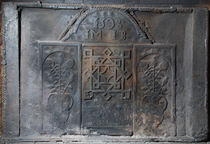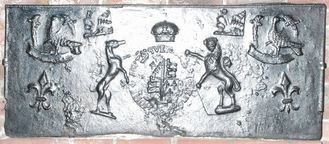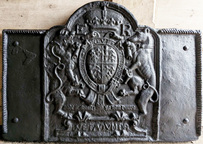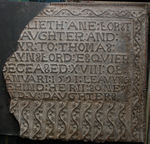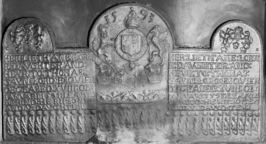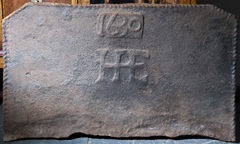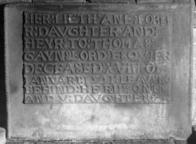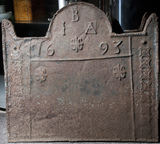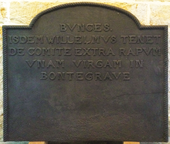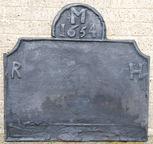-
914
Description: Rectangular shape; twisted rope edging (top and sides) with fillet edging at bottom; cast of a 1598 fireback within a recessed panel, the arch of the original fireback being overlaid with twisted rope and diagonal lengths of rope laid alongside. The original fireback is described as follows: Composite of three elements; central panel has a complex ‘knot’ pattern with a fillet edge; side panel, repeated on either side of the central panel, contains a vase of flowers, possibly stylised thistles, within an arched frame and fillet edge; arched panel above, also with fillet edge, contains the date and inscription; the spandrels of the side panels, and the arched top panel, contain a series of 'bullseye' motifs comprising concentric rings deepening towards the centre.
Notes: The central fireback measures 795mm wide by 735mm high and is from a different casting to that seen at Linchmere, Sussex (no. 475).
Inscription: 1598 / IM IB
- Decoration tags:
- rectangular (shape)
- rope (edging)
- composite
- planklines
- text
- plants
- objects
Manufactured: in the late-16th to early-17th century in the Weald area of England.
Current location: Goddards, Abinger Common, Abinger, Surrey, England.
- Attached to series:
- Armada series
- Composite firebacks
- Garden design types
-
10
Description: Rectangular; rope edging (top and sides); central Tudor royal shield with encircling garter (motto reversed: HONE SOVT QVEY … PEN), separate greyhound and lion supporters, separate crown; a bird, repeated in each top corner, its wings displayed and inverted and its head facing behind and to the left, standing on a scroll; a fleur de lys repeated in the bottom corners; inside the birds is a repeated stamp, half of one similar to a stamp on a fireback in Hastings Museum.
Notes: The particular form of the Tudor arms and supporters is encountered on other firebacks, as are the distinctive style of fleurs de lys and the birds (probably swans, a Lancastrian icon). The plain scroll upon which the bird is perched suggests that there might have been a painted inscription on it originally and that the stamp had not been made specifically for the decoration of firebacks but was, perhaps, redundant from interior domestic decoration. Formerly at Framfield, East Sussex.
Arms: Tudor royal (prob. Elizabeth I)
- Decoration tags:
- rectangular (shape)
- rope (edging)
- carved stamps
- heraldic
- armorial
- royal
- objects
Manufactured: in the mid- to late-16th century possibly at Pounsley Furnace, Framfield in the Weald area of England.
Current location: The Clergy House, Alfriston, East Sussex, England.
Museum number: 200044 (part of the National Trust museum group)
-
1288
Description: Arched rectangular shape with rounded corners; ovolo within fillet moulding all round; oval Tudor royal shield with garter surrounding, topped with a royal crown; dragon and greyhound supporters; initials split by crown; inscription on a fillet between legs of supporters, behind garter finial; motto on an Ionic plinth at bottom; two rectangular side panels with twisted rope edging top and side.
Notes: The supporters are those of Henry VII or Henry VIII, but the initials suggest the fireback dates from the reign of Edward VI (1547-53). John Harvo (d. c1565) was a gunfounder who has been identified as occupying Pounsley furnace, Framfield, Sussex, possibly from as early as 1547; the fireback may have been cast originally during the reign of Henry VIII (1509-47), with the initials added to an early casting using the original pattern. The detail on the armorial back is good, showing little wear, so the casting was probably made not long after the original armorial fireback. The rivets are modern.
Inscription: E R / HONY SOIT QVE MAL Y PAYNCE / Made in Sussex by John Harvo / DV ET MOVN DROI
Arms: Tudor royal - Probably Henry VIII
- Decoration tags:
- rectangular with round arch (shape)
- rope (edging)
- simple stamps
- whole carved pattern
- heraldic
- armorial
Manufactured: in the mid- to late-16th century in the Weald area of England.
Current location: not known.
- Attached to series:
- John Harvo series
- Pounsley series
-
12
Description: Rectangular; twisted rope edging on top and sides; inscription panel with repeated trailing vine decoration from impressed wooden strips — one horizontal line at top, one vertical strip on right side (missing but probably repeated on left), at least ten short vertical strips below inscription.
Notes: Formerly at Fulling Mill Cottages, and possibly formerly at Wakehurst Place, Ardingly; it was moved to Ardingly church sometime after 1915. The inscription panel is identical to that on the memorial plate to Anne Forster in Crowhurst church, Surrey; at least ten other firebacks are known with the same inscription panel. Edward Culpeper (1561-1630), of Wakehurst, was fourth cousin, once removed, of Anne Forster. Assuming the vine strip and rope edging on the left side were of approximately the same width as on the right the overall original width of the fireback is estimated to have been 837mm.
Inscription: HER : LIETH : ANE : FORST/ R : DAVGHTER : AND : / HEYR : TO : THOMAS : / GAYNSFORD : ESQVIER / DECEASED : XVIII : OF: / IANVARI : 1591 : LEAVYNG / BEHIND : HER II : SONES : / AND : V : DAVGHTERS
- Decoration tags:
- rectangular (shape)
- rope (edging)
- carved stamps
- carved pattern panels
- planklines
- text
- plants
Manufactured: in the late-16th century possibly at Pounsley Furnace, Framfield in the Weald area of England.
Current location: St Peter's Church, Church Lane, Ardingly, West Sussex, England.
Citation: Holgate, M. S., n.d., The Parish Church of St Peter, Ardingly: Historical and Architectural Notes.
-
200
Description: Composite; rectangular with semi-circular arches in middle (large) and ends (small) of top edge; rope on all edges except bottom; central panel effectively comprises an arched fireback form with Tudor royal arms (temp. Elizabeth I) with date above, and, below, letters G M, made from rope with fleur de lys terminals between two coronets surmounted by lions; below this are fronds with roses. On either side of this panel are placed the Anne Forster inscription panels; above each of these is a rose and crown with lion and dragon supporters, beneath which are three fleurs de lys. Along the base of the inscription panels and the central panel are single rows of ‘grape bunch’ shapes, beneath which are repeated trailing vine decoration from impressed wooden strips across the entire width of the fireback; 35 in all.
Notes: Formerly at Baynard's Park, Ewhurst, Surrey; GM probably refers to Sir George More, who built Baynards Park after buying the estate in 1587, and who moved to Loseley in 1604. The central coat of arms has been noted on two other firebacks, dated 1588 (no. 41) and 1595 (no. 482). The rose and crown stamps have been noted on a fireback in Haslemere Museum, and on examples illustrated by Lower (all of which bear the date 1582 and the initials IA; e.g. no. 107 or no. 472). The association of these stamps and the particular form of rope lettering, with the Anne Forster inscription and the ‘grape bunch’ shapes, both of which have been linked with other stamps from Pounsley furnace, suggests that they, too, were part of the stock of those works.
Inscription: 15 93 / GM / HER : LIETH : ANE : FORST/ R : DAVGHTER : AND : / HEYR : TO : THOMAS : / GAYNSFORD : ESQVIER / DECEASED : XVIII : OF: / IANVARI : 1591 : LEAVYNG / BEHIND : HER II : SONES : / AND : V : DAVGHTERS [twice]
Arms: Tudor royal
- Decoration tags:
- rectangular with three arches (shape)
- rope (edging)
- simple stamps
- carved stamps
- carved pattern panels
- individual letters
- individual numbers
- planklines
- heraldic
- armorial
- royal
- text
Manufactured: in 1593 possibly at Pounsley Furnace, Framfield in the Weald area of England.
Current location: not known.
Citation: Manning, O. & Bray, W., 1809, History of Surrey Vol. II (London, John White), p. 369n.
Citation: Ogilvy, J. S., 1914, A Pilgrimage in Surrey, vol. 2 (London, G. Routledge & Sons), p. 8.
-
1229
Description: Rectangular with canted top corners; twisted rope edging (top and sides); top centre, date formed from a single stamp, over-pressed; monogram below date.
Notes: Dates formed from a single stamp are uncommon, this series being distinguished by this practice. Formerly at a house in Rochester. Bentley Auctioneers, Cranbrook, lot 889, 4 Jun 2022 (£130).
Inscription: 1630 / HPE
- Decoration tags:
- rectangular with canted top corners (shape)
- rope (edging)
- carved stamps
- date stamp
- monogram
- text
Manufactured: in 1630 in the Weald area of England.
Current location: not known.
- Attached to series:
- 1630s HPE series
-
18
Description: Rectangular; twisted rope edging; otherwise plain plate with inscription panel centre top.
Notes: Inscription panel identical to that on the memorial plate to Anne Forster in Crowhurst church, Surrey. At least ten other firebacks are known with the same inscription panel.
Inscription: HER : LIETH : ANE : FORST/ R : DAVGHTER : AND : / HEYR : TO : THOMAS : / GAYNSFORD : ESQVIER / DECEASED : XVIII : OF: / IANVARI : 1591 : LEAVYNG / BEHIND : HER II : SONES : / AND : V : DAVGHTERS
- Decoration tags:
- rectangular (shape)
- rope (edging)
- carved pattern panels
- planklines
- text
Manufactured: in the late-16th century possibly at Pounsley Furnace, Framfield in the Weald area of England.
Current location: The Six Bells Inn, High Street, Billingshurst, West Sussex, England.
- Attached to series:
- Pounsley series
- Anne Forster series
- Epitaph firebacks
-
1142
Description: Arched rectangular shape with quadrant extensions on top corners; twisted rope edging (top and sides); vertical rope line parallel to each side, forming two separate side panels; horizontal rope line joined to vertical lines enclosing the following: inside arch, initials IBA in triad; below initials, double fleur-de-lys stamp between split date; below horizontal line, a double fleur stamp in each top corner of central lower panel; in each side panel, a single bead above a vertical sequence of squared cross stamps repeated eight times.
Notes: The distinctive squared cross and fleur stamps are seen on other firebacks; the initials in triad may relate to a husband and wife. A taller variant of the same fireback is at Northgate House, Warwick (no. 1106). Mendip Auctions, Binegar, Somerset, 7 Sep 2019, lot 374.
Inscription: IBA [triad] / 16 93
- Decoration tags:
- rectangular with round arch (shape)
- rope (edging)
- simple stamps
- carved stamps
- individual letters
- individual numbers
- objects
Manufactured: in 1693 in the Forest of Dean area of England.
Current location: not known.
- Attached to series:
- Newent area group
- Square cross Dean series 2
- Fleur-de-lys firebacks
-
1206
Description: Arched rectangular shape; twisted rope edging (top and sides); top, centred, text in five lines uppercase with the letter 'U' represented as 'V'.
Notes: Apart from the word 'Bunces' the text is an expanded transcription of the entry in the Domesday Book for Birch Grove, south of East Grinstead. Allegedly it was the author, Rudyard Kipling, who suggested to the then owner of that property that the text be used to decorate a fireback.
Inscription: BVNCES. / ISDEM WILLELMVS TENET / DE COMITE EXTRA RAPVM / VNAM VIRGAM IN / BONTEGRAVE
- Decoration tags:
- rectangular with round arch (shape)
- rope (edging)
- whole carved pattern
- text
Manufactured: in the early-20th century in England.
Current location: in private hands, Horsted Keynes, West Sussex, England.
- Attached to series:
- Commemorative firebacks
-
878
Description: Cavetto-canted arched rectangle; twisted rope edging, separately around rectangle and arch; initials 'R' and 'H' in upper left and right corners of rectangle; 'M' above date in arch.
Notes: The arch does not appear to have been a separate stamp, although the rope edging gives that impression; the initials, in triad, suggest a husband and wife - R.. and H.. M..
Inscription: M / 1654 / / R H
- Decoration tags:
- rectangular with canted top corners and round arch (shape)
- rope (edging)
- simple stamps
- carved stamps
- individual letters
- individual numbers
- text
Manufactured: in 1654 possibly in the Weald area of England.
Current location: in private hands, Birling, Kent, England.
- Attached to series:
- Date & initials firebacks
